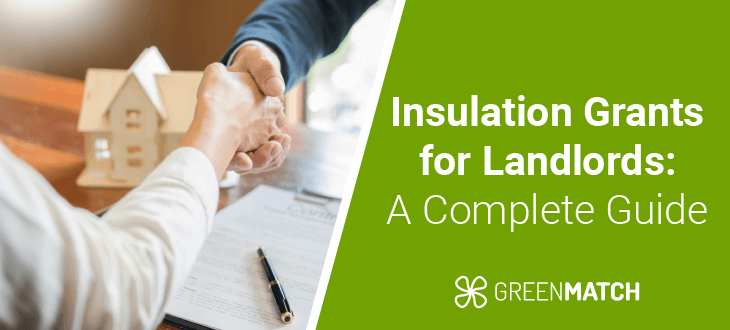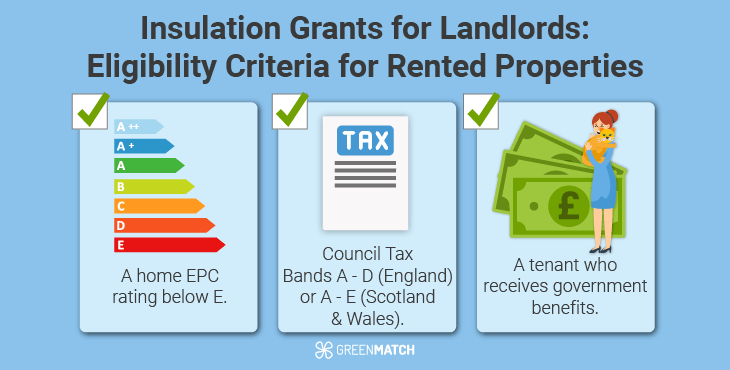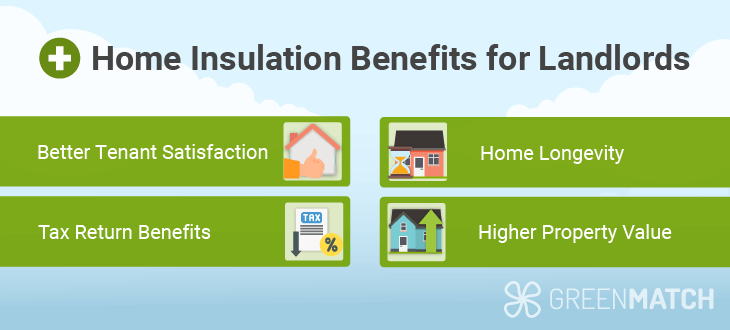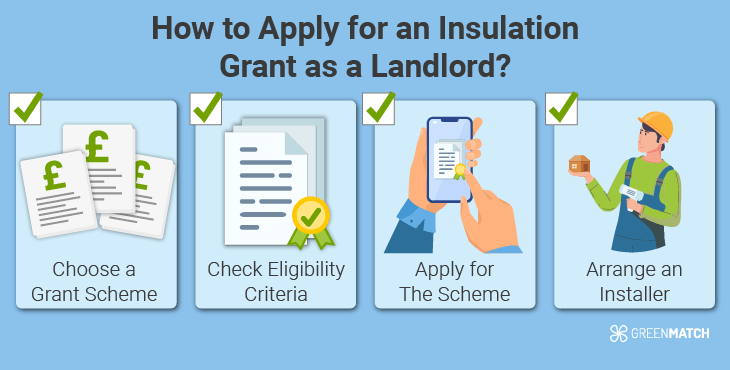Answer these simple questions and we will find you the BEST prices
Which type of solar quotes do you need?
It only takes 30 seconds
100% free with no obligation

Get Free quotes from insulation specialists near you

Save money by comparing quotes and choosing the most competitive offer

The service is 100% free and with no obligation
- GreenMatch
- Insulation
- Insulation Grants
- Landlord Insulation Grants
Insulation Grants for Landlords: A Complete Guide


- The Great British Insulation Scheme (GBIS) and the Energy Company Obligation (ECO4) are two UK grant schemes currently providing home insulation.
- Landlords can reclaim up to £1,500 on insulation investments through annual tax returns with the HM Revenue & Customs (HMRC).
- The current nationwide grant schemes in the UK are available until March 2026.
UK insulation grants are a great way to cover insulation prices of home upgrades for landlords and their tenants. By using existing government grant schemes, landlords can improve the livability of their homes, reduce the CO2 impact it generates, and even raise the overall value of their properties on the housing market.
It’s a win-win for both landlords and their tenants!
But how does one go about getting a home insulation grant? Does the tenant apply, or does the landlord? What can a grant cover? This ultimate guide by GreenMatch UK will give you all these answers and more so that you can confidently apply for a grant scheme to upgrade your property.
Ready to insulate your home? Look no further than GreenMatch UK to free you from the pesky burden of researching and vetting. Instead of spending endless hours scouring the web for the right installers, just spend 30 seconds on our online form, and we’ll send you up to 3 free home-tailored quotes from our network of professional installers. Click below to begin!
- Describe your needs
- Get free quotes
- Choose the best offer
It only takes 30 seconds



Can landlords get a grant for insulation?
Technically, there are no direct insulation grants for landlords alone. Most often, landlords don’t directly apply for an insulation grant, but tenants can apply on their behalf as they pay the energy bills. The job of a landlord in this circumstance is to give written permission for insulation works to be carried out on their property.
In the case of full cost coverage, neither the landlord nor the tenant has any financial obligations. However, if the provided grant is only a partial cost coverage, it is the responsibility of the landlord to cover the remaining cost.
This isn’t such a bad thing though, as the landlord's property will have a higher EPC score and greater market value, and insulation costs can be recouped through tax return declarations.
Can you get your landlord to insulate your house?
Any tenant has the legal right to ask their landlord for home insulation upgrades, and any landlord generally has the legal right to accept or reject the request. However, the UK’s Minimum Energy Efficiency Standards (MEES) requires landlords to improve the energy efficiency of properties with EPC ratings of F and G.
Landlords are expected to contribute up to £3,500 in home improvements such as floor, loft and wall insulation to increase the EPC rating to E. In the future, there are plans to raise this EPC rating gap even higher.
If you are a private renter of a property, consult your Energy Performance Certificate (EPC) to check whether your property rating falls below the guidelines set by the MEES. If so, chances are your landlord may be obliged to improve your home's insulation.
All private rented properties must legally have an Energy Performance Certificate (EPC) rating. If you do not know of your home’s EPC rating, make sure to get in touch with your landlord!
Insulation grants available to landlords and tenants
At the moment, there are two key nationwide grant schemes in the UK. These are the Great British Insulation Scheme (GBIS) and the Energy Company Obligation (ECO4).
Both grant schemes exist to help fuel-poor, low-income, and energy-inefficient homes with a wide range of insulation upgrades, in line with the UK’s ambitious Net Zero by 2050 goals. Some examples include wall, loft, and underfloor insulation grants.
Applicants can benefit from these schemes until March 2026 but have to be applied to directly by the tenant. In turn, the landlord will have to provide a written permission statement that allows insulation works to be carried out on their property. It’s strongly recommended to apply sooner rather than later to maximise the chances of landing assistance through a grant scheme.
The Great British Insulation Scheme
The Great British Insulation Scheme (GBIS) is a government initiative that focuses on delivering a single insulation measure per qualifying household, such as wall insulation grants. This is because the main focus of the GBIS is to expand its nationwide reach across the UK.
The chosen insulation measure is decided after a property assessment to determine what would be the most effective course of action to improve the property's energy efficiency.
The Energy Company Obligation (ECO4)
The Energy Company Obligation (ECO4) is a government scheme for boosting domestic energy efficiency with a more whole-house approach. The ECO4 places a direct obligation on energy providers to deliver energy-efficient measures for inefficient and fuel-poor homes.
Unlike the GBIS scheme, the ECO4 provides more than just insulation for house purposes, but also energy upgrades such as heating system replacement, repairs, smart controls and much more.
Property assessments are generally free of charge but – alongside the actual installation – have to be carried out by a PAS 2030-2035 accredited installer. The Publicly Available Specifications (PAS) are a series of required guidelines that grant-specific installers have to abide by.
This helps make sure that insulation jobs are carried out with the highest quality and workmanship, thus avoiding unnecessary repairs from faulty installations.
Insulation grants for landlords: eligibility criteria for rented properties

Tenants who privately rent from a landlord have slightly different eligibility criteria for grant schemes in comparison to homeowners.
The main criteria for a landlord insulation grant are as follows:
- EPC rating: Private property renters may qualify for grant assistance if the property they rent has an EPC rating below E. Consult your Energy Performance Certificate to check the grading of your property’s energy efficiency.
- Council tax bands: The property in question must fall under the council tax bands A - D in England, or A - E in Scotland and Wales. Council tax bands tell you how much council tax you need to pay based on the value of your property.
- Government benefits: As a landlord, if your tenant receives certain government benefits or allowances, you likely qualify for grant assistance for insulation. This may indicate they are classed as the Low-Income Group.
There is currently a list of government benefits and allowances that are generally recognised as a marker of eligibility for a grant scheme. Some of the main ones are:
- Income-based Job Seekers Allowance
- Income-related Employment and Support Allowance (ESA)
- Income Support
- Pension Credit
- Guarantee Credit
- Working Tax Credit
- Child Tax Credit
- Universal Credit
- Housing Benefit
If you meet this qualification criteria for a grant scheme, it’s highly recommended to apply. That way, you can save money on an expensive investment, create a more livable home, reduce its environmental impact, and even boost your property value in the housing market.
Advantages for landlords to insulate their properties

Home insulation is a gift that keeps on giving. With a wealth of benefits to expect, both tenants and their landlords can benefit from a properly insulated home for years to come.
Here’s a summary of some of the benefits landlords can enjoy with an insulated property:
- Better tenant satisfaction: Nobody likes living in a moist, cold, and drafty home. With proper insulation, landlords can provide their tenants with a healthy satisfying home environment that leads to better satisfaction and even reduced turnover costs.
- Tax return benefits: Landlords can recoup up to £1,500 from expenses invested into property insulation. This can be done through annual tax returns with the HM Revenue & Customs (HMRC). This way, a large portion of the initial investment is automatically recouped just from the first year of instalment!
- Home longevity: In line with the UK’s ambitious Net Zero by 2050 goal, it’s expected that landlords will be required to boost their property’s efficiency up to a C rating by 2035. As a result, landlords who insulate their homes properly from the get-go will enjoy peace of mind and less burdensome costs for years to come.
- Higher property value: Homes with a higher EPC grading are valued better in the housing market. That way, by insulating your home, you are also investing in the future of your property and its capacity to generate income.
As seen, home insulation is not just beneficial for the tenant, but for the landlord as well. It’s an all-round winning solution to bettering your savings, your property, and even the environment.
How can landlords apply for an insulation grant?

Generally, insulation grants are applied for by the tenant with the given permission of the landlord, but the landlord can apply on behalf of the tenant in certain circumstances.
The application process doesn’t differ whether you apply as a tenant or a landlord, or whether you apply for free loft insulation or some other measure, but requires the full details of the tenant residing in the landlord's property.
The process of applying for a grant is as follows:
- Choose a grant scheme: The currently available schemes are the Great British Insulation Scheme (GBIS) and the Energy Company Obligation (ECO4). While both schemes provide insulation upgrades, they are carried out in different ways and have differences in their provisions. Choose a scheme that best suits your needs.
- Check eligibility criteria: Once you’ve made a decision, make sure you meet the scheme's eligibility criteria as a landlord, or that your tenant meets the criteria expected of them. Ensuring this will make sure you do not waste time on an application.
- Apply for the scheme: To apply for the GBIS scheme, you can visit the official UK government website and fill in the application form. Make sure to fill out the details of the tenant respectively. For the ECO4 scheme, the tenant can contact their energy provider to learn more about the application process and eligibility.
- Arrange an installer: For either the GBIS or ECO4 scheme, it’s mandatory to work with a professional installer that is PAS 2030-2035 certified. It’s in your interest as well, because it ensures that you receive the highest quality workmanship for the job.
While it seems straightforward enough, finding a professional insulation specialist at a favourable price can sometimes feel like a needle in a haystack. Prospective landlords, tenants, and homeowners often find themselves endlessly cycling through web pages and phone calls with no clear choice in sight. That’s where GreenMatch UK comes in!
Through our services and wide-spanning network of trusted installers in the UK, we can save you from the burden of researching and vetting. Just spend 30 seconds filling out our simple online form, and we’ll deliver you up to 3 free home-tailored quotes from trusted installers at competitive prices. No hidden charges or extra obligations apply. Click below to begin!
- Describe your needs
- Get free quotes
- Choose the best offer
It only takes 30 seconds



FAQ
Technically speaking, landlords do not directly apply to get a grant for insulation, however, their tenants can apply on their behalf. This is because the tenant is responsible for paying the energy bills. In turn, the job of a landlord is to give written permission for insulation works to be carried out on their property.
Like tenants or homeowners, landlords can benefit from either the Great British Insulation Scheme (GBIS) or the Energy Company Obligation (ECO4) for insulation and home efficiency upgrades. Both grant schemes have qualification criteria that it’s important to familiarise with before applying.
You are legally entitled to ask your landlord for improved insulation, but your landlord can also legally refuse if they are not required to do so by law. This is why it’s important to check your home’s EPC rating before signing a lease to ensure it meets your needs.
However, tenants in homes with an EPC rating below E can legally ask for improved insulation, as landlords are required to ensure their property has at least an E rating.

Akif is a copywriter at GreenMatch since 2023. With a keen interest in community sustainability, green solutions and the role of digital media in identifying climate trends, he aims to hone in on his background in International Studies and Digital Media to provide a multidisciplinary approach to written content rooted in credible research and accuracy.
We strive to connect our customers with the right product and supplier. Would you like to be part of GreenMatch?

- Insulation Grants for Landlords: A Complete Guide
- Can landlords get a grant for insulation?
- Insulation grants available to landlords and tenants
- Insulation grants for landlords: eligibility criteria for rented properties
- Advantages for landlords to insulate their properties
- How can landlords apply for an insulation grant?
- FAQ
